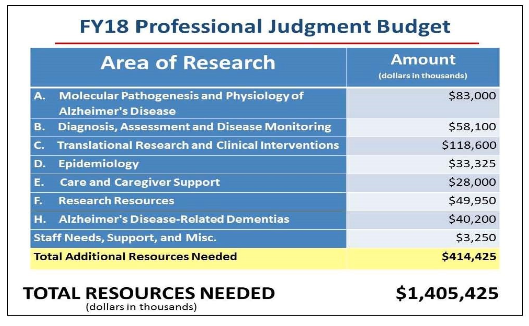National Plan to Address Alzheimer’s Disease Updated; NIH Releases FY 2018 AD Bypass Budget
On August 1, the Advisory Council on Alzheimer’s Research, Care, and Services under the auspices of the Health and Human Services (HHS) Office of the Assistant Secretary for Planning and Evaluation (ASPE) discussed a draft of the National Plan to Address Alzheimer’s Disease: 2016 Update. At that same meeting, National Institute on Aging (NIA) Director Richard Hodes presented the NIA’s fiscal year (FY) 2018 Alzheimer’s Disease (and related dementias) Bypass Budget, “Stopping Alzheimer’s Disease and Related Dementias: Advancing Our Nation’s Research Agenda.”
In 2011, Congress passed the National Alzheimer’s Project Act (NAPA) in an effort to change the “trajectory” of Alzheimer’s Disease and related dementias (ADRD). The statute called for a National Plan for ADRD with input from a public-private Advisory Council on Alzheimer’s Research, Care, and Services. The plan, established in 2012, has five goals:
- Prevent and Effectively Treat Alzheimer’s Disease by 2025
- Optimize Care Quality and Efficiency
- Expand Supports for People with Alzheimer’s Disease and Their Families
- Enhance Public Awareness and Engagement
- Track Progress and Drive Improvement
The 2016 update addresses the progress made in realizing the plan’s “implementation milestones,” including removing completed items and adding new projects, papers, and initiatives, among other items, to the Goals and Strategies section.
The 2011 statute also directed NIA to develop an annual professional judgment or “bypass” budget “to estimate the funds needed to fully pursue scientific opportunities to meet the research goal of the Plan—to effectively treat and prevent Alzheimer’s and related dementias by 2025.” Accordingly, the budget estimate specifically addresses biomedical research needs as well as ADRD care and services research. The bypass aspect of such a budget allows the NIA director to transmit the agency’s budget for AD research directly to President via the National Institutes of Health (NIH) director and the Secretary of Health and Human Services and then to Congress without alterations.
Hodes reported that the baseline estimate for the FY 2018 professional judgement budget for AD, including ADRD, is $991,000 and will serve as the new baseline for tracking related expenditures according to the accompanying milestones. This sum is $414 million in FY 2018 above NIH’s base appropriation for Alzheimer’s and related dementias.
 Hodes also highlighted the NIH meetings and accompanying recommendations that provided the rationale for the priorities, milestones, and budget estimates in the FY 2018 bypass budget. According to the NIA director, 13 of the 27 NIH institutes and centers provided feedback that has been incorporated in the FY 2018 professional judgement budget. NIH will submit a bypass budget through FY 2025. NIA will provide detailed tracking of the initiatives and awards associated with the research milestones using a web-based tool.
Hodes also highlighted the NIH meetings and accompanying recommendations that provided the rationale for the priorities, milestones, and budget estimates in the FY 2018 bypass budget. According to the NIA director, 13 of the 27 NIH institutes and centers provided feedback that has been incorporated in the FY 2018 professional judgement budget. NIH will submit a bypass budget through FY 2025. NIA will provide detailed tracking of the initiatives and awards associated with the research milestones using a web-based tool.
With regards to social and behavioral science research, the bypass budget includes additional funding in FY 2018 to support research that expands the understanding of:
- “Who develops Alzheimer’s disease, and who seems to be protected?
- What conditions or activities are associated with development of the disease?
- What are the financial, economic, social, and policy costs of the disease?”
Investment by the agency in the development of new research tools and “groundbreaking initiatives,” such as adding a new data resource—the Harmonized Cognitive Assessment Protocol—to the Health and Retirement Study, which tracks the health, economic, and social status of older adults, is emphasized in the bypass budget. Additional funds would also be directed towards the expansion of population and health disparity investments.
Similarly, additional support would be provided in FY 2018 for research designed to improve the lives of those living with dementia as well as their caregivers, including:
- Developing and validating assessments to determine the impact of caregiving on psychological, financial, and physical health in observational, interventional, and longitudinal population-based studies;
- Establishing a data infrastructure for the study of dementia caregiving;
- Developing a project to inform the design of cost-effective, community-based caregiving interventions that enable people with Alzheimer’s to remain in their homes.
The NIH’s FY 2018 Bypass Budget Proposal is available here.

